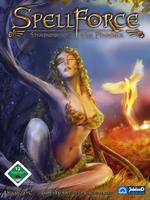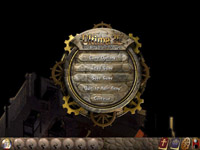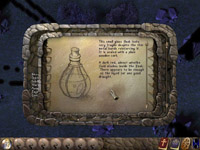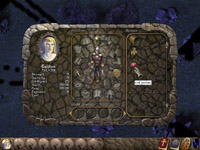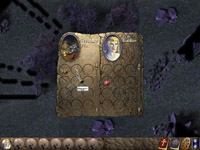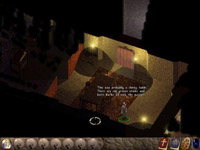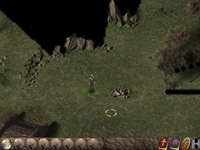|
|
|
Main News Forums Games Games Database Top 100 Release List Support Files Features Reviews Previews Interviews Editorials Diaries Misc Download Gallery Music Screenshots Videos Miscellaneous Staff Members Privacy Statement |
Ultima 4 - The Dawn of Virtue Interview Garrett, 2002-07-01
RPGDot: Please introduce yourself and your role in the Ultima 4 team to our readers. Jaakko Peltonen: Greetings! I am Jaakko Peltonen, the project leader
of Ultima IV: The Dawn of Virtue. I am 24, and Finnish. Laura Campbell: My name is Laura Campbell (aka Shadow of Light). I am the team dialogue writer. Ewan Munro: I'm called Ewan Munro some of the time, Tailrace Dragon the rest. I do dialogue editing and some writing. Bernard Ng: My name is Bernard Ng. I'm a 24-year old Malaysian studying at the University of Tennessee, Knoxville, TN, USA. My role with the U4:TDoV team is 2D artist. Jasmyne Poste: Jasmyne "Firetalon" Poste, 2d artist.
RPGDot: Why did you choose Ultima 4 for a remake? Is it your favourite Ultima? Laura Campbell: A lot of fans consider Ultima IV to be the game where the series truly began. It's when the virtues first appear. Britannia's basic shape, its cities, shrines and dungeons are kept for the rest of the series. Ultima 4 is when you *become* the Avatar, perhaps the most important part of Ultima lore and Britannian history. The original game, though, is very old, and it ran on a limited engine. We want to resurrect it with the majestic art, music and dialogue such an epic deserves. Jaakko Peltonen: As Laura noted, Ultima IV is a turning point in the
Ultima series, and defined the theme of the entire series from that point
onwards. Since the storyline had such great effects, it is a very
interesting chapter to revisit in the remake, and one that anyone who has
played Ultima games can enjoy. With modern resources at our disposal, we
can bring new look at the story, and add new embellishments and details to
the world. Hopefully, it will also introduce new players to the series. Bernard Ng: Oh dear. It is with some embarrassment that I admit I've never actually *played* Ultima IV. I know the story in general, but that's only because I have played Ultima VII (which I loved), the Ultima Underworld series (which I absolutely adored), Ultima Online (which I had to quit playing so I could graduate... phew) The Savage Empire (which, by the mid-90s, seemed a little dated), and bits of Ultima VIII (I got stuck halfway and decided it wasn't worth figuring out). I'd love to have a go with this remake when it's done. I tried playing an emulated version of U4 once... but it kept freezing up when I entered buildings. Argh! Jasmyne Poste: I'm just following orders. ;) RPGDot: Why did you choose to use your own engine and not the DS or NWN Editor? Jaakko Peltonen: There are several reasons for that. By using a new
engine we are not restricted by the capabilities and resources in any
existing one; that makes it easy to include any features we like in the
game.
Bernard Ng: I think that if you already have an engine you're familiar with (and the U4 engine is Jaakko's lil baby), it makes sense to go with what you know. And Jaakko gets more credit too. :) RPGDot: What is your graphics engine capable of (zoom, turn camera)? Jaakko Peltonen: The engine uses isometric graphics,
similarly to games like the Baldur's Gate series, Arcanum or the
Commandos series. The backgrounds are based on prerendered art, with
some animated objects like running fountains. All characters, other
creatures and many objects are drawn as animated polygon-based 3D
models; there are closeups of some of these models on the U4:TDoV
website. In addition, there are special effects like particle-based
spell effects and lighting changes due to day/night cycles. You may
also have weather changes such as rain. Jasmyne Poste: It gives you super strength and laser vision. RPGDot: How close do you keep to the original U4? What did you change (story, NPCs, other things)? Jaakko Peltonen: Our goal here is to embellish and add to the content
of the original game. I believe that the original storyline works well,
and there is no need to make major changes to it. Besides, we wish to
maintain continuity within the Ultima series. Laura Campbell: We're trying to keep as close as possible to the
original story. All the original NPCs will be present, but some new ones
will also appear. One of the big changes is dialogue. The original NPCs
were lucky if their entire conversational capacity reached twenty words.
In The Dawn of Virtue, they average around two thousand words. Ewan Munro: It's basically the same as the original, but with extra NPCs, vastly expanded dialogues, new quests and subquests, fancy graphics, additional music, and so on. Bernard Ng: All I want added is a singing dog named Bernie (and now that I've said it, it's likely not going to happen :p). Jaakko Peltonen: The U4:TDoV world is a detailed and story-rich world and has lots of features to discover. But no singing dogs named Bernie yet. ;)
RPGDot: Is there a party or a single avatar party only? Jaakko Peltonen: Your character starts the game alone, but as the game progresses, you will be able to gather more companions. In fact, some of the bigger battles in the game will be difficult to win without a large party. Laura Campbell: There will be room for your character and seven companions, just like the original. In fact, this was a prerequisite for winning the game. ;) Ewan Munro: Of course there's a party!! Bernard Ng: What are you talking about? The whole thing will be one big party! *breaks out the cone hats, confetti, and tooters* RPGDot: What is the character generation like? Are there gypsy questions? Jaakko Peltonen: Character generation is very much like in other Ultima
games; it is a fairly quick process. There is first an initial screen
where you select a name, gender and portrait for your character; there is a
picture of that screen here: www.hut.fi/~jtpelto2/ultima4/create_character.jpg
One new feature that we are including in U4:TDoV is the ability to import
customized portraits for your character. RPGDot: How does combat take place? Jaakko Peltonen: Combat is real-time and happens on the same view
as the rest of the game. You are able to pause the game anytime and
give orders while paused, though. The system is similar to those seen
in most real-time strategy games. RPGDot: And what about Magic? Jaakko Peltonen: The magic system is very interesting. Spellcasting is based on the
'eight circles' system used from Ultima V onwards: it is a two-stage
process where you first construct (mix) a supply of spells, and then cast
them using mana (magic points). Mixing takes time, so players need to
think ahead what spells they will need before venturing into danger.
RPGDot: And how about conversation with NPCs? There are multiple choice answers - do they affect the gaming world? Jaakko Peltonen: Conversations are an important part of the game. They
actually use a hybrid system with both multiple-choice and keyword
options, so you aren't pre-given all the possibilities. Ewan Munro: You can either pick your responses from a list (UW2 style), or in many cases type in keywords. I have no idea what you mean by "affect the gaming world". Laura Campbell: NPCs will react to and remember what you say, so be
careful. They will hopefully behave like real people in that respect, and
they *are* the gaming world. You might be in trouble if someone gets angry
and stops speaking to you. Worse trouble if the guards are called. RPGDot: Is there an automap and a journal? What do they look like? Ewan Munro: There'll be a journal that you can fill in as you trundle along, but I don't know about an automap. Jaakko Peltonen: There is an editable in-game journal; it looks very
much like the book in this screenshot: www.hut.fi/~jtpelto2/ultima4/book.jpg
except that you can write into it. RPGDot: The graphics look a little like the Infinity Engine (IE). Can the engine be compared to the IE games like Baldur's Gate or Icewind Dale? Jaakko Peltonen: Well, although I have been very impressed with the
Infinity Engine games, I am not knowledgeable about how that engine
itself works. There would seem to be some similarities, though, most
clearly the use of rendered graphics and the viewpoint. Bernard Ng: Hey! You didn't mention Planescape:Torment! Planescape:Torment was cool! And I think the 2.5D look of Jaakko's engine is just great for RPGs. And sure it can be compared to the IE engine... they both rock.
RPGDot: Overall, is the gameplay more action or more story oriented? Jaakko Peltonen: There is plenty of both styles; I'd say that there is
more story, but this depends partially on the region: some parts of
Britannia will have larger amounts of monsters and combat, while others
are more peaceful. Towns are mostly story-oriented, and the wilderness has
more combat encounters. Dungeons are somewhere between the two; there is
combat, but also puzzles and dialogue. Laura Campbell: I believe there will be a fairly equal balance. Bernard Ng: I would hope it's more story oriented... I'm one of those people who loved having the 5 billion lines of dialogue they put into Ultima VII (I'm serious!). If I wanted an action-oriented 'RPG', I'd play Diablo *cough* *cough*. But a mix would be good too I guess. RPGDot: What makes U4 the best remake among the numerous others in production? Jaakko Peltonen: Well, I don't really view these remake projects as
being in competition; they are mostly focused on different Ultima games
and/or aspects of the series, so enjoying one of them doesn't prevent
gamers from also playing and enjoying others. Our mutual challenge is to
create an excellent game in the Ultima tradition; rather than other
remakes, comparisons are best made with the Ultima series, and with RPGs
in general. Jasmyne Poste: Because we're just so much cooler than other remake people. :) Laura Campbell: Er, no comment. ;) I'm working with two other remakes so
I can't play favourites. ;) Ewan Munro: With none of the remakes actually being complete yet, I personally have no idea which one will be best... Bernard Ng: It's gonna be one big party! *hands out the cone hats and tooters* RPGDot: What other features would you like to add to the game and which didn't make it and why? Jaakko Peltonen: There are always so many. ;) Mostly, they are
trade-offs. For example, I would have liked to try a completely
polygon-based environment, but that would increase development time a lot.
Rendered graphics limit the level of interaction somewhat below what I
would like to have: for example, you can't push a table around. On the
other hand, with rendered graphics there is no need to worry about things
like polygon counts when constructing the environments. Ewan Munro: The game isn't done yet, so there's still plenty of time for the inclusion of new features. RPGDot: Will there be more remakes by you? Jaakko Peltonen: Possibly; the engine is suitable for many purposes, so I might be interested to use it again in another setting. It also depends on how U4:TDoV is received. I will listen carefully to what people think about the upcoming demo and about the final game. Laura Campbell: I'm doing dialogue for U5:Lazarus and U9:Redemption as well, so that's sort of a 'yes'. If Jaakko needs a dialogue writer in the future, though, he knows how to contact me. :) Ewan Munro: No idea. I like to take one remake at a time. Bernard Ng: I have no plans to hop on board any projects in the future. If this turns out to be a good experience, I might try to lend my services to something else later on. RPGDot: What is your opinion about Ultima being an online game only anymore? Do you think one can put the Ultima RPG idea into a MMORPG? Jaakko Peltonen: Well, there are several aspects to the Ultima series.
One of them is to create an immersive, life-like world, and I believe this
can work very well in an online game. Other aspects - grand, heroic
quests, the philosophy - are also possible; this depends on what the
players are interested in. Laura Campbell: Hmmm... I haven't played Ultima Online in a while, but
it did little to inspire me the way the series did. It even shocked me, a
little, to learn from some of the UO players that they had never heard of
nor played the Ultima series. I think the key element for making a MMORPG
into a true Ultima rests with its players, and, with the kind of players
you get on the OSI shards, that is nigh impossible. The concept of the
virtues are pretty much unknown, and (until recently) players walked in
constant fear of being killed and robbed by other players.
Ewan Munro: I haven't played UO, but from what I've heard about it, there isn't any similarity between it and an Ultima (other than a few names). Bernard Ng: I kinda wish they'd continue the single-player Ultimas in some form, but I don't see anything wrong with UO either. What it comes down to is what you want for your gaming time. If you want an open-ended social romp, UO's the way to go. If you want to *be* the avatar and save the world, you may be better off playing any of the single-player Ultimas. Jasmyne Poste: RPGs were originally meant to be played with other people. Although there is no 'Avatar', I think Ultima can survive just fine online as it can on a single PC. RPGDot: Do you have problems with EA and may they force you to cancel your project? Jaakko Peltonen: Not at all. I haven't had any trouble. I have contacted Electronic Arts about the remake; I have not received permission from them yet, but I very much hope to do so. I have also contacted Mr. Richard Garriott, and received his permission. I have always intended to create this remake in an honest and above-board manner, respecting the copyrights and trademarks involved, so I hope that we will be allowed to proceed with it. RPGDot: When do you expect to have the game finished? Ewan Munro: Well, whatever we tell you now is bound to be changed later... :) Jaakko Peltonen: The game is scheduled to be completed near the end of the year. Before that, we will release a playable demo; we are currently preparing that. RPGDot: Thank you for the interview! Jaakko Peltonen: You're very welcome! Laura Campbell: Thank you for your interest. :) Happy gaming! Bernard Ng: Thanks! |
|||||||||
|
All original content of this site is copyrighted by RPGWatch. Copying or reproducing of any part of this site is strictly prohibited. Taking anything from this site without authorisation will be considered stealing and we'll be forced to visit you and jump on your legs until you give it back. |
||




